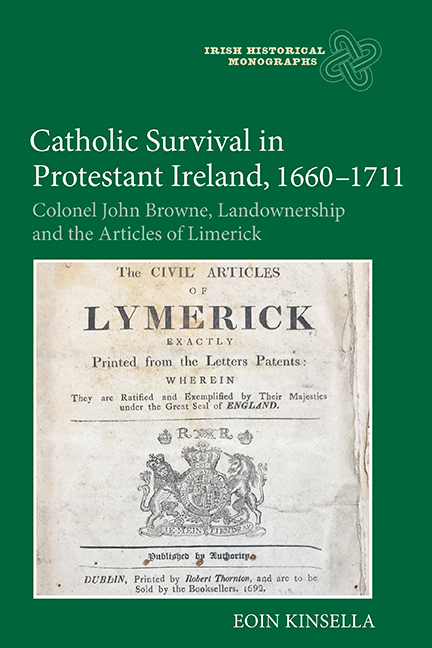 Catholic Survival in Protestant Ireland, 1660–1711
Catholic Survival in Protestant Ireland, 1660–1711 Book contents
- Frontmatter
- Dedication
- Contents
- List of Illustrations
- Acknowledgements
- List of Abbreviations
- Editorial Note
- Glossary
- Introduction
- Part I The Rise and Fall of the ‘New Interest’
- Part II The Articles of Surrender
- Part III Article 13 of Limerick
- Conclusion
- Appendix A Articles of Surrender, 1690–91
- Appendix B Hearings scheduled for adjudication under the articles of Limerick, 1694
- Appendix C Proclamations of 7 July & 1 August 1691; ‘A copy of and answers to several complaints made by the Irish by their agent Mr Cockly’
- Bibliography
- Index
Conclusion
Published online by Cambridge University Press: 28 June 2018
- Frontmatter
- Dedication
- Contents
- List of Illustrations
- Acknowledgements
- List of Abbreviations
- Editorial Note
- Glossary
- Introduction
- Part I The Rise and Fall of the ‘New Interest’
- Part II The Articles of Surrender
- Part III Article 13 of Limerick
- Conclusion
- Appendix A Articles of Surrender, 1690–91
- Appendix B Hearings scheduled for adjudication under the articles of Limerick, 1694
- Appendix C Proclamations of 7 July & 1 August 1691; ‘A copy of and answers to several complaints made by the Irish by their agent Mr Cockly’
- Bibliography
- Index
Summary
The trajectory of John Browne's career, between the Restoration of Charles II in 1660 and the death of William III in 1702, mirrored that of the wider Catholic ‘new interest’. None of his contemporaries were, however, able to match Browne's extreme levels of success and failure. Between 1666 and 1680 Browne created an enormous estate in the west of Ireland, consisting of more than 155,000 acres. Not content with this accomplishment, he also set out to establish himself as an ironmaster, rapidly accumulating debts as he sought to build a profitable business. This was to prove his undoing. Heavily indebted by the mid-1680s, Browne never again enjoyed a period of financial stability. Given time he may have been able to recover his position, but James II's reign introduced a period of instability in the three kingdoms that culminated with William of Orange's invasion of England in November 1688. Browne's subsequent support for the Jacobite cause was as wholehearted as any, though the underlying motive is clear. In the event of a Jacobite victory, James II would have written off at least a portion of those debts in payment for Browne's services. Trusting in this eventuality, and on the acquisition of a new estate from forfeited Protestant lands, Browne did not join with other prominent ‘new interest’ landowners who actively assisted the Williamites during the war. His loyalty ensured a place at the negotiating table in 1691 as a representative of the Jacobites, and offered an opportunity that Browne gladly took. The resulting articles of surrender set the course of the remainder of his life.
Article 13 of Limerick ensured that Browne was unique among the articlemen. The article itself was exceptional in that the legislative and executive branches of government made repeated attempts to ensure its implementation and to secure parliamentary ratification, beginning with the very first parliament of the post-war era. On their side too, the motive is clear – the vast majority of the beneficiaries of article 13 were Protestant and many were members of parliament or officeholders. Beyond the confines of his immediate family, it is difficult to know how Browne was regarded by Catholics in Connacht, or indeed the rest of Ireland. His sons-in-law clearly looked to him for advice and counsel, even if relations with both were occasionally strained.
- Type
- Chapter
- Information
- Catholic Survival in Protestant Ireland, 1660–1711Colonel John Browne, Landownership and the Articles of Limerick, pp. 236 - 246Publisher: Boydell & BrewerPrint publication year: 2018


